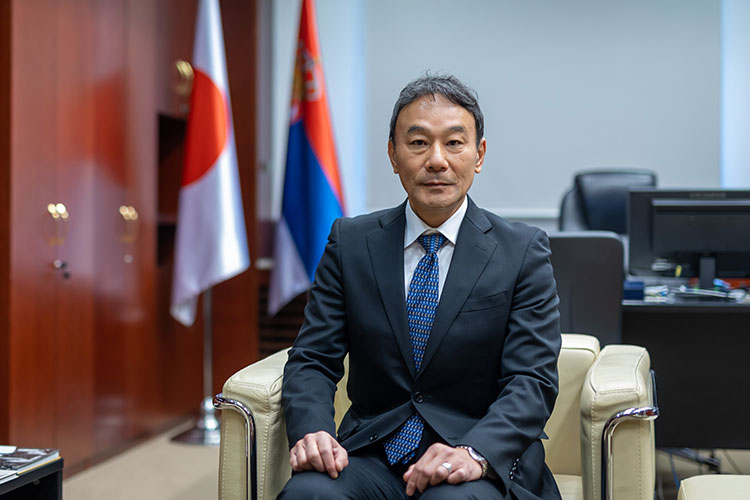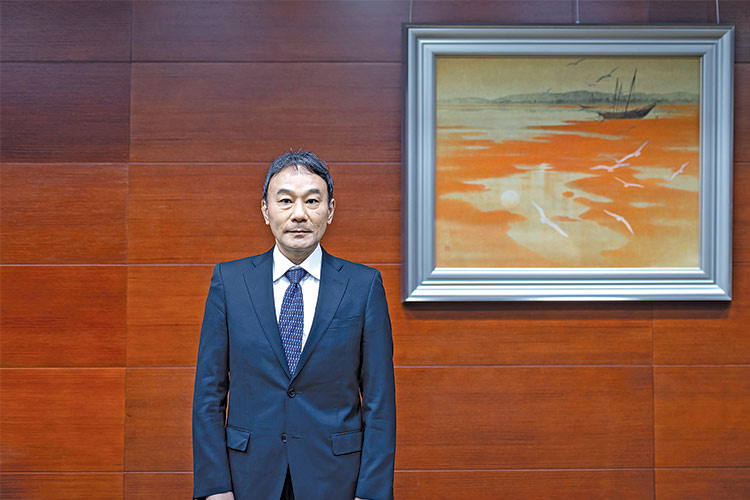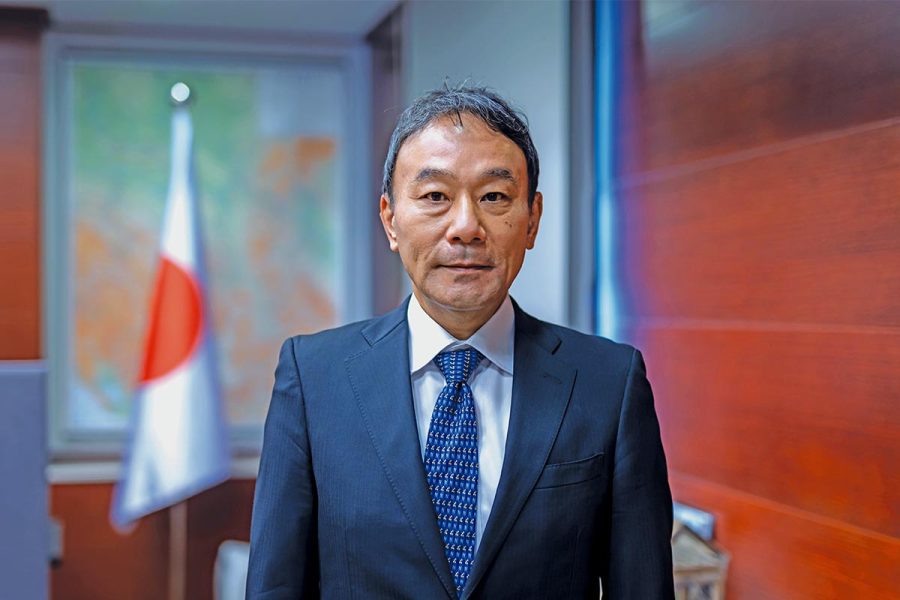Based on the long history of friendship between Japan and Serbia, and the sharing of values in a wide range of fields, such as diplomacy, economics, culture, sports, education and regional development, has steadily progressed and is truly significant ~ Takahiko Katsumata
Easy access to major European markets and favourable trade agreements with other regions of the world, competent workers with “reasonable” salaries and incentives provided to foreign investors by the state are the reasons for the increased interest in investing in Serbia among Japanese companies. The strengthening of economic relations is built upon friendly bilateral relations that have been confirmed during the times of the greatest challenges, both for Serbia and for Japan, says Japanese Ambassador Takahiko Katsumata in this interview for CorD Magazine, referring to the major anniversary of bilateral relations commemorated in 2022.
Your Excellency, we have left behind a year that was dedicated to the commemorating of the 140 years of friendship and bilateral relations between Japan and Serbia. Are you satisfied with the way this important date was marked?
Yes, I am very satisfied. During this important year, the Embassy of Japan, the Serbian Government, local communities, Japanese business associations, various cultural and sports organisations and many friends of Japan and Serbia energetically planned and implemented more than 40 commemorative events. Each event involved many people and they offered unconditional support in celebrating our friendship. Through these events, we conveyed our gratitude to all the people of Serbia who have made efforts to strengthen relations with Japan, and confirmed the bonds of friendship.
Based on the long history of friendship between Japan and Serbia, the sharing of values in a wide range of fields, such as diplomacy, economics, culture, sports, education and regional development, have steadily progressed and that is truly significant.
It can also be said that the bilateral relationship has been underpinned by a common tradition of mutual respect and support – especially when Serbia was in a difficult situation after the 1990s and when Japan was hit by a major earthquake and tsunami in 2011, the spirit of mutual friendship was demonstrated. Japan will never forget the warm support and kind hearts of the Serbian people.
With this 140th anniversary of friendship as a new start for the further development and strengthening of bilateral relations, to bring them to a higher level, I and the Embassy of Japan would like to work together with all of you.
Serbian Prime Minister Brnabić stated recently that she has sent invitations to visit Serbia to the Prime Minister of Japan and members of the imperial family. Do plans exist to realise such a visit at the highest level?
Prime Minister Ana Brnabić met with Prime Minister Fumio Kishida during her last visit to Japan in September last year, on the occasion of the state funeral of late Prime Minister Shinzo Abe.

I was pleased to hear that, during the meeting, Prime Minister Brnabić expressed her intention to invite the imperial family to Serbia, recalling that our two countries’ friendship was established by the exchange of letters between Their Majesties Emperor Meiji and King Milan Obrenović in 1882.
We sincerely hope to realise such a royal visit in order to deepen the friendly relations between our two countries.
Japanese companies employ around 7,000 people in Serbia, mostly in agriculture, the auto industry and the IT sector. Given that the arrival of Japanese companies is dependent on recommendations from the government, what would you say about Serbia’s current investment climate?
First of all, I would like to express my sincere appreciation to the central and local governments of Serbia for their continuous efforts aimed at improving the business environment in Serbia. There are three main reasons behind the acceleration of Japanese companies’ investments in Serbia in recent years.
First is easy access to large markets in various regions like the EU, other European countries and Turkey, with free trade agreements or open economic access. Second is Serbia’s human resources, in terms of an excellent workforce at a reasonable cost. Third are the various forms of support and incentives from the central and local governments.
The bilateral relationship has been underpinned by a common tradition of mutual respect and support – especially when Serbia was in a difficult situation after the 1990s and when Japan was hit by a major earthquake and tsunami in 2011, the spirit of mutual friendship was demonstrated. Japan will never forget the warm support and kind hearts of the Serbian people
Japan has also been taking various measures to promote Japanese companies’ investments in Serbia under the Western Balkans Cooperation Initiative announced by late Prime Minister Abe in 2018. Specifically, the Tax Convention between Japan and Serbia entered into force in December 2021 and facilitates companies’ business activities in Serbia, while a JETRO Business Mission representing a variety of Japanese industries visited in October last year.
Although the outlook remains uncertain due to the pandemic and the situation in Ukraine, the Embassy will continue to work with JBAS (Japanese Business Alliance in Serbia) and JETRO (Japan External Trade Organization) to provide Japanese companies with precise and objective information on Serbia and to work with the Serbian authorities to further improve the investment environment in the country.
You pointed out during your recent visit to the Chamber of Commerce of Vojvodina that this province is particularly attractive to investors from Japan, due to its good geostrategic position and strong connections with other regions, as well as its good connectedness with the academic community and the economy. Japanese companies in Vojvodina include Toyo Tires in Inđija and NIDEK in Novi Sad. Do you see opportunities for Japanese companies to invest in other parts of Serbia?
As you pointed out, large-scale investment by Japanese companies in AP Vojvodina has continued in recent years. On the other hand, the Serbian Government has established 15 free zones – not only in Vojvodina, but also in many regions, and various foreign companies have been promoting business in these regions.
The Serbian Government has additionally been promoting infrastructure projects throughout the country, such as railways and highways, which will help to reduce regional gaps and further improve the investment environment.

Japan would like to continue working together with the Government of Serbia to promote new investments in various regions, with a view to the sustainable development of Serbia as a whole, including the promotion of human resources that represent any country’s core driving force.
Environmental protection has become a topic that’s of interest to an increasing number of Serbian citizens. What could you tell us about the Japanese- funded desulphurisation projects attheNikolaTeslaThermalPowerPlant and the installation of waste processing systems in Vinča? Are there plans to include Japanese companies in other environmental projects?
This year, the Flue Gas Desulphurisation Project financed by a Japanese Government yen loan will be completed at the Nikola Tesla Thermal Power Plant. Regarding the Waste Management Project in Vinča (public-private partnership), an “energy- from-waste” facility that represents the uniqueness of this project is scheduled to be fully operational this year. In addition, since last year, Japan has been working with UNDP on a project to support Serbia’s green transition and decarbonisation.
I think these line-ups of ecological approach show Japan’s serious consideration of environmental protection, which should be addressed not only by specific countries and regions, but also in cooperation on a global basis. Japan will therefore continue to contribute to the sustainable development of Serbia, in cooperation with Japanese companies, JICA (Japan International Cooperation Agency), international organisations and other partners, by providing its expertise, knowledge and technology.
On the occasion of PM Brnabić’s recent visit to Japan and her meeting with her Japanese counterpart PM Fumio Kishida, there was also discussion of Serbia’s stance with regard to the war in Ukraine and Belgrade’s decision not to impose sanctions against Moscow. As ambassador of a country that has joined the sanctions against Russia to the greatest extent, how do you view Serbian reservations over the introduction of such sanctions?
During that Summit meeting held last September in Tokyo, Prime Minister Kishida stressed the importance of a united response from the international community towards the Russian invasion against Ukraine, which threatens the very foundations of the international order. At the same time, he appreciated Serbia’s efforts in standing with Ukraine, as in adopting relevant resolutions of the UN General Assembly condemning the Russian invasion, as well as extending assistance to Ukrainian evacuees.
Although the outlook remains uncertain due to the pandemic and the situation in Ukraine, the Embassy will continue to work with JBAS and JETRO to provide Japanese companies with precise and objective information on Serbia and to work with the Serbian authorities to further improve the investment environment in the country
I have personally spoken with officials of the Government of Serbia in order to share the importance of a coordinated response from the international community, including the introduction of sanctions against Russia. While Serbia is still not applying the sanctions against Russia, through a series of conversations with them I have come to understand that Serbia is well aware of the importance of such a united response of the international community, as mentioned by PM Kishida, and that it does not take Russia’s side on this matter at all.
With reference to Serbia’s support to Ukraine, I visited the reception centre for Ukrainian evacuees in Vranje, established by the Government of Serbia, and I witnessed that they were treated rather adequately and expressed thanks for the assistance from the Serbian side.
I think the importance remains in unifying our unwavering response against the Russian aggression to stop current tragedies in Ukraine.
An incident unprecedented in the more recent history of Japan occurred this summer, when former Prime Minister Shinzo Abe was assassinated in July 2022. What impact did that murder have on Japanese society?
Six months have already passed since the tragic assassination of former Prime Minister Abe on 8th July last year. The unforgivable brutality of gunshot in the middle of an election campaign that is the foundation of democracy had a tremendous impact on Japanese society. His state funeral was attended by 700 delegates from approximately 218 countries, regions and international organisations, including Prime Minister Brnabić from Serbia. I would like to again express my gratitude to the Government of Serbia for its high respect to late former Prime Minister Abe. Through the state funeral, Japan responded to the condolences of other countries with courtesy and demonstrated its determination to protect freedom and democracy.

Mr Abe visited a total of 196 countries and regions during his tenure, which was the most among previous prime ministers of Japan and developed the Japanese diplomatic concept “diplomacy that takes a panoramic perspective of the world map”. Mr Abe advocated a “Free and Open Indo-Pacific Strategy” and led the strengthening of security cooperation with such key countries as the United States, Australia and India. He shared fundamental values and strived to shape a free and open international order based on the rule of law. In order to carry on his diplomatic legacy, Prime Minister Kishida met with more than 30 foreign dignitaries, including Prime Minister Brnabić, both before and after his state funeral. Inheriting the diplomatic principles set forth by Mr Abe, PM Kishida emphasised Japan’s intention to act proactively in the interests of the peace and stability of the world.
Following in the footsteps of Mr Abe, who laid the foundations for Japan’s diplomacy in the future, we will work hard to cooperate to achieve peace and prosperity of the international community, further strengthening the Japan-U.S. Alliance, cooperation with ASEAN, Europe and other like-minded countries. We will demonstrate, both nationally and internationally, our determination to firmly inherit and develop the diplomatic legacy cultivated by former Prime Minister Abe.
Could you tell us more about the effects of the “Western Balkans Cooperation Initiative”, which was launched in January 2018 by former PM Abe with the aim of supporting socioeconomic reforms in the Western Balkan countries that aspire to join the EU and promoting cooperation among those countries?
The “Western Balkans Cooperation Initiative” is the first diplomatic concept of Japan to clarify its support for the EU accession of the Western Balkan countries and the facilitation of their regional cooperation.
Under the scope of this Initiative, we promoted bilateral relations by realising high-level dialogues, extending development and social assistances, promoting Japanese companies’ investments and so on. I am very pleased with the fact that, on the territory of the Western Balkans, the Initiative gave the most visible effect in Serbia, leading to a drastic increase in the presence of Japanese companies in these years making high-quality investments in aligning with the concept of the Initiative.
The Initiative also promotes regional cooperation and cooperation with third parties, i.e., cooperation among Japan, the Western Balkans, the EU and its member states. For example, the Government of Japan organises seminars for experts on the common agenda of the Western Balkans, such as the prevention of natural disasters. I believe this provides all participating countries with effective and useful opportunities to strengthen their mutual relations.
Following in the footsteps of Mr Abe, who laid the foundations for Japan’s diplomacy in the future, we will work hard to cooperate to achieve peace and prosperity of the international community, further strengthening the Japan-U.S. Alliance, cooperation with ASEAN, Europe and other likeminded countries
We are also working with EU member states on joint projects in the Western Balkans. In Serbia, we successfully completed the project to reconstruct the Centre for Returnees and Local People in Prokuplje last year, in cooperation with the Government of Germany. We are very happy to work together with EU member states interested in the further development of the Western Balkans, including Serbia.
It was announced recently that the Government of Japan will provide the country’s domestic economy with almost 270 billion dollars to help overcome the consequences of rising inflation and the impact on the national currency. Are you worried about concerns over a new global economic crisis?
Although the outlook remains uncertain, I don’t believe this is the first time such a situation has arisen. In any era, it is necessary to carefully gather and analyse information on the international and domestic situation, and to identify the issues that need to be addressed. Based on calm and precise analysis, it is important to take timely and steady measures with a broad, long-term perspective and in close international collaboration. We will continue to work this year with warm hearts and cool heads towards sustainable development that also takes future generations into account.
The enduring friendship between Japan and Serbia is also reflected in the expression of mutual support during troubling times. You often mention the support shown for Japan by Serbia in the aftermath of the catastrophic earthquake of 2011, while Serbian citizens remember Japan’s support during the post-2000 years of economic hardship. You recently presented awards to members of the team responsible for maintaining the public transport buses that arrived in Belgrade as a donation from Japan almost 20 years ago. Have you ridden on those buses and are you satisfied with the positive effects of that donation?
“Friends in hard times are true friends.” During last year, marking the 140th anniversary of the friendship between Japan and Serbia, we made efforts to restore our ties that were almost broken apart by the pandemic, keeping these words of belief in our mind.
The “yellow buses” have been carefully maintained and continuously used by Serbian citizens for almost 20 years, and have become a symbol of friendship between our two countries. As our appreciation for such efforts, last year I decided to present awards to the engineer who has been involved in the maintenance of these buses for many years, in order to reconfirm our firm ties. As for economic cooperation, I feel that mutual trust can only be fostered through implementation based on a good understanding of the other party’s position and difficulties. On the other hand, efforts need to be exerted to maintain trust, and it is easy for it to break down without these efforts. Japan would therefore like to continue to maintain and deepen our trust with our strong efforts both this year and beyond. We should never leave our friends behind.
| ROYAL VISIT We sincerely hope to realise such a royal visit in order to deepen the friendly relations between our two countries | IMPROVEMENT I would like to express my sincere appreciation to the central and local governments of Serbia for their continuous efforts aimed at improving the business environment in Serbia | WB COOPERATION INITIATIVE I am very pleased with the fact that, on the territory of the Western Balkans, the Initiative gave the most visible effect in Serbia, leading to a drastic increase in the presence of Japanese companies |
|---|